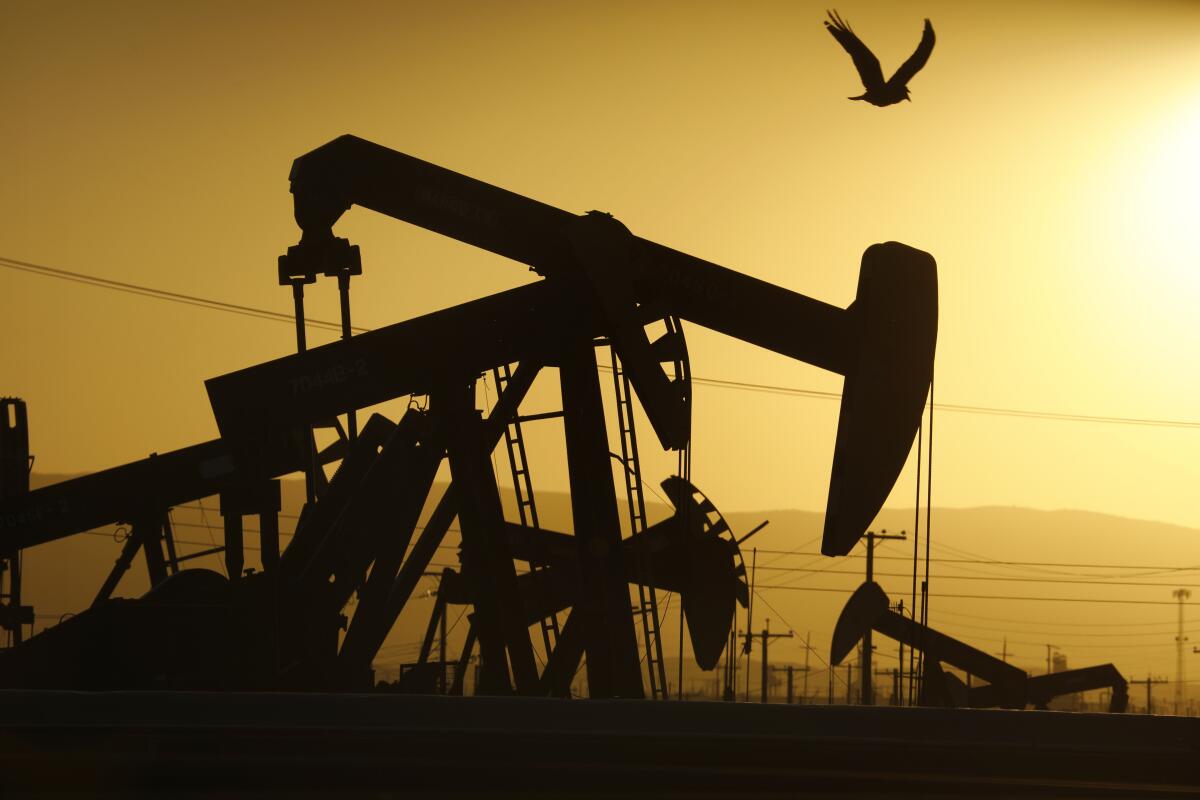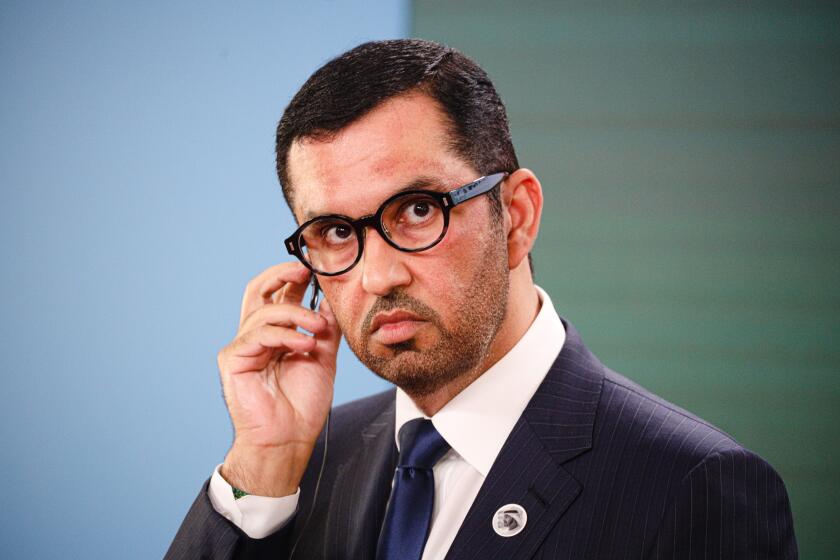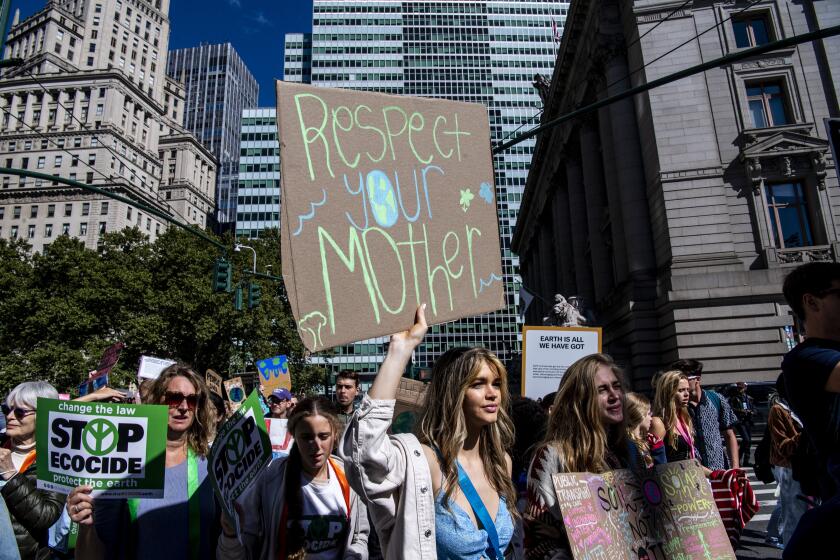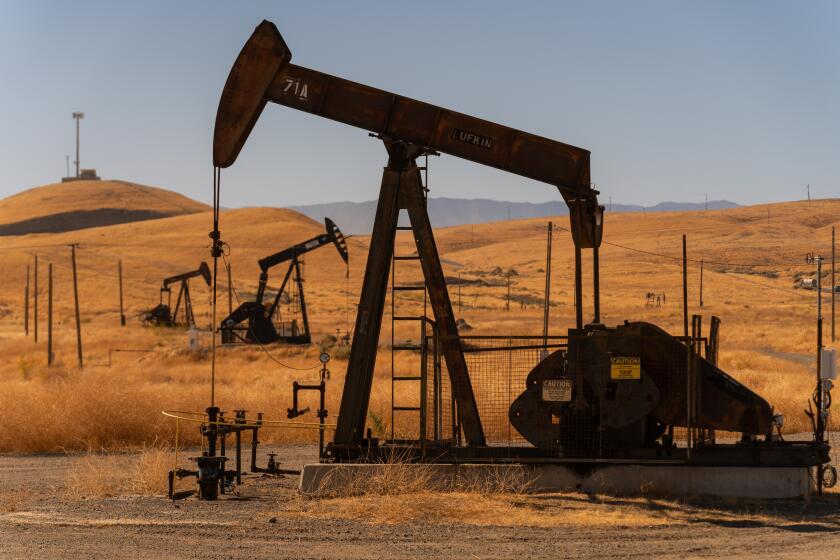Editorial: On climate change, world leaders are saying one thing and doing another

- Share via
World leaders will gather for the COP28 United Nations climate summit in Dubai starting Thursday. And already, there are troubling signs that we’ll see another year of powerful countries spouting a lot of hot air but ultimately shirking their obligations to protect humanity from grievous and irreversible harm caused by the burning of fossil fuels.
A U.N.-backed report released earlier this month found that despite their promises, the world’s governments still plan to produce and consume more than twice as much coal, oil and gas in 2030 as they should to limit global warming to 1.5 degrees Celsius, a gap that’s remained basically unchanged since 2019.
Editorial: An oil executive’s going to host the U.N. climate summit. It shows who’s really in charge
Climate activists and politicians have likened the decision to letting arms dealers lead peace talks or putting a tobacco CEO in charge of health policy.
“These plans throw the global energy transition into question. They throw humanity’s future into question,” Inger Andersen, executive director of the United Nations Environment Program, wrote in the report. “Governments must stop saying one thing and doing another.”
When will leaders get serious and understand that they can’t have it both ways? Humanity can’t zero out greenhouse gas emissions without slashing the production and consumption of fossil fuels.
While thousands prepare to march in New York City with a clear demand to protect the environment for future generations, some of those in power are talking about ending only “unabated” emissions.
For two years running, world leaders at these annual climate change conferences have gone no further than a pathetic call for a “phasedown of unabated coal power.” It says a lot that after decades of scientific understanding of the dangers and causes of climate change, an explicit reference to fossil fuels didn’t appear in the final text of a COP decision until 2021.
As a result of this failure, humanity is on track to blow past the critical threshold of 1.5 degrees Celsius, or 2.7 degrees Fahrenheit. That’s the rise in global temperatures that virtually every nation on Earth agreed to work to avoid under the 2015 Paris agreement in order to prevent disastrous climate impacts.
Editorial: An oil executive’s going to host the U.N. climate summit. It shows who’s really in charge
Climate activists and politicians have likened the decision to letting arms dealers lead peace talks or putting a tobacco CEO in charge of health policy.
The repercussions of countries not delivering on their pledges to cut heat-trapping emissions are life-or-death, and any shortcomings can’t be easily reversed. The consequences of inaction are already manifesting in the form of more ferocious heat waves, storms and wildfires, rising sea levels, drought and damage to marine and terrestrial ecosystems. It’s going to get worse, but just how bad depends on what leaders do now.
In advance of the COP28 summit, hundreds of scientists are urging President Biden to “agree to a fast and fair phaseout of all fossil fuels (coal, oil, and gas), with clear timelines and science-informed targets for the near and long term.” The group of more than 650 scientists is also calling on the Biden administration to push back on fossil fuel interests and their allies who might try to weaken the final agreement.
California’s oil industry has launched a PR campaign to exploit the economic anxieties of the state’s large Latino community to fight vehicle electrification and other pollution-cutting policies.
That’s important because the summit typically draws hundreds of fossil fuel lobbyists working to stymie progress toward renewable energy. And though this year they will be required to identify themselves as such when registering, the gathering is still regrettably being presided over by United Arab Emirates oil executive Sultan Al Jaber, who has made it clear that he wants to focus only on phasing out fossil fuel emissions, not fossil fuels themselves.
That’s a dangerous approach oil and gas interests have been pushing aggressively, and it’s not hard to see why. It leaves them free to continue extracting and burning fossil fuels, while promising to somehow offset the effects with largely unproven projects to capture and store carbon underground or suck it out of the air.
World leaders are still doing far too little to stop the burning of fossil fuels. If they won’t heed climate scientists, can we at least get them to listen to the pope?
This reckless fantasy only serves to prolong the life of these planet-endangering industries. The U.N.’s recent report makes clear that uncertain technologies should not be considered escape valves because of the “potential failure of these measures to become sufficiently viable at scale.”
The only safe path forward is for the world’s nations to commit to ending the extraction and burning of coal, oil and gas. We simply cannot keep putting this off, year after year, and expect anything but a dark and painful future. Change has to start with the United States, which is both the world’s richest nation and the most responsible for climate change, having spewed more planet-warming pollution into the atmosphere than any other country in history.
If we don’t act now, everyone’s future will be in peril.
More to Read
A cure for the common opinion
Get thought-provoking perspectives with our weekly newsletter.
You may occasionally receive promotional content from the Los Angeles Times.














